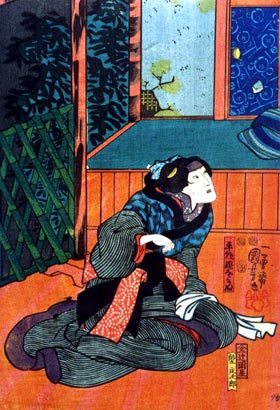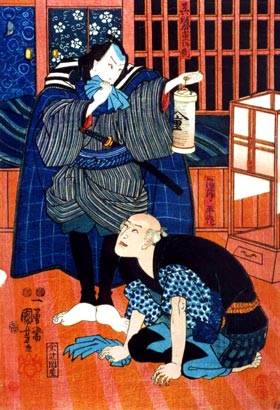| NUMAZU |
| Play title | Igagoe Dôchû Sugoroku Igagoe Norikake Gappa |
||||||||||||
| Authors | Chikamatsu Hanji, Chikamatsu Kasaku ("Igagoe Dôchû Sugoroku") Nagawa Kamesuke I ("Igagoe Norikake Gappa") |
||||||||||||
| History |
The play "Igagoe Dôchû Sugoroku" was originally written for the puppet theater (Bunraku) and staged for the first time in the 4th lunar month of 1783 in Ôsaka at the Takemotoza. The authors drew their inspiration from Nagawa Kamesuke I's successful drama "Igagoe Norikake Gappa", which was directly written for Kabuki and was staged for the first time in the 12th lunar month of 1776 in Ôsaka at the Naka no Shibai [casting]. "Igagoe Dôchû Sugoroku" was adapted for Kabuki the same year and staged for the first time in the 9th lunar month of 1783 in Ôsaka at the Naka no Shibai [casting]. This play is based on the famous Igagoe vendetta, which took place in 1634. When it was dramatized, the names and details, and even the era were changed because of censorship by the ruling Tokugawa Shogunate:
|
||||||||||||
| Structure |
"Igagoe Dôchû Sugoroku" is made up of 10 acts. "Numazu", which is divided into 3 scenes, is act VI. This is the most popular act of this drama and it is frequently staged. |
||||||||||||
| Key words |
Adauchi Gidayû Kyôgen Giri/Ninjô Gofukuya Igagoemono Jidaimono Katakiuchi Matsubara Sandai Adauchi Tôkaidô |
||||||||||||
| Summary |
Heisaku was a poor man who lived at Numazu with his pretty daughter Oyone. He tried to make a pittance by acting as a baggage porter to travellers on the great road which ran past his home. His daughter had a samurai lover called Wada Shizuma who was involved in a family feud which entailed searching out the man responsible for his father's death. At the time of the play, Shizuma had been severely wounded in an affray and had gone into hiding in the country near the home of his sweetheart Oyone, who tended him faithfully. One day old Heisaku met a city merchant called Jûbê travelling along the highway and offered to carry his baggage. The traveller took pity on the poor old fellow and allowed him to shoulder the load. Unfortunately the old man was unequal to the task and finally collapsed, badly hurting his legs. The merchant took out some ointment and tended Heisaku's wound, which was cured immediately, almost miraculously as it seemed. It was getting late, and Jûbê gladly accepted the offer of his porter to spend the night in his humble home and was especially glad he had done so after Heisaku's pretty daughter appeared on the scene. On arrival at their cottage Heisaku told his daughter all about the wonderful medicine carried by their guest. In the meantime the guest, smitten with the girl's charms, made advances and proposed marriage. She repulsed him indignantly and told him she was already affianced. After this reversal the crestfallen Jûbê retired to bed. When the lamps were out and the two men asleep, Oyone decided to steal the ointment from Jûbê in order to cure the wounds of her lover. She stealthily approached Jûbê's bed but stumbled in the dark and caused such a clatter that the merchant woke immediately and seized hold of the marauder. Heisaku then appeared with a light to find out what the disturbance was about. During the course of all the explanations necessary to clarify the situation, Jûbê suddenly realized that Heisaku was his own father and Oyone his sister. This is a favorie ruse on the Japanese stage and is justified by the fact that child adoption was a widespread custom in former times. It was common for parents in adverse circumstances or with insufficient resources to allow one or several of their children to be adopted by a childless family or, in particular, one lacking a male heir, the desire of every Japanese being to carry on the family name and occupation. There is no need to go into the social implications of this system here, but only to point out that it offered a conveniently ready-made surprise situation for the writer of popular plays. Jûbê's discovery was tempered by the realization that the enemy sought by Oyone's lover was, in fact, the man to whom he owed his prosperity and good station in life. Torn by conflicting emotions, Jûbê kept his silence. Daybreak had come, and he prepared to continue on his journey. But when he said goodbye he secretly left behind a seal case containing the wonderful ointment and the certificate of parentage provided by Heisaku at the time of his son's adoption. When the old man and his daughter discovered these objects they realized that it was a son and brother who had passed the night with them. On examining the seal case Heisaku discovered that it belonged to the enemy of his daughter's lover. He decided to overtake Jûbê on the highway and ask him to give them information of the whereabouts of the man they had sought so long. Oyone, accompanied by one of her lover's retainers, quickly followed her father. They took a short cut known to them and soon came up with Jûbê at a spot called the Thousand Pines. Here they hid behind a milestone as Heisaku approached Jûbê to ask for the required information. The merchant refused to divulge the secret of his benefactor's whereabouts. Understanding his son's loyalty, Heisaku decided to put filial loyalty to the extreme test, and taking out a knife, he stabbed himself. As a dying wish he begged Jûbê to whisper the required information, as without that information it would be impossible for his soul to rest in peace. Jûbê, fully aware that Oyone and her companion were listening close at hand but deeply moved by the determination of his own people to save family honour, gave the information to his dying father in a tone loud enough for the others to hear. Then he set off on his journey again, turning but once to see his sister weeping over the dead body of the old man. Source: A. C. Scott |
 |
 |
|
The actors Onoe Baikô IV, Bandô Hikosaburô IV and Ichikawa Kodanji IV playing the roles of Oyone, Jûbê and Heisaku in the drama "Igagoe Yomekiri Kôshaku", which was staged in the 2nd lunar month of 1852 at the Ichimuraza (print made by Utagawa Kunoyoshi) |
|
|
|
| Contact | Main | Top | Updates | Actors | Plays | Playwrights | Programs | Links | FAQ | Glossary | Chronology | Illustrations | Prints | Characters | Derivatives | Theaters | Coming soon | News |